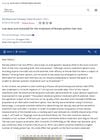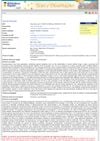355 citations,
January 2017 in “Journal of the American Academy of Dermatology” JAK inhibitors show promise for treating skin conditions like eczema, hair loss, and psoriasis.
 126 citations,
January 2001 in “World Journal of Surgery”
126 citations,
January 2001 in “World Journal of Surgery” Surgery is the main treatment for liver hydatidosis, but has risks; albendazole is the most effective drug but can have side effects.
 124 citations,
October 2019 in “Frontiers in Immunology”
124 citations,
October 2019 in “Frontiers in Immunology” Janus kinase inhibitors are promising treatments for autoimmune skin diseases like eczema and psoriasis.
87 citations,
December 2015 in “Cochrane library” No single treatment is clearly effective for central serous chorioretinopathy.
 77 citations,
June 2017 in “Advances in Therapy”
77 citations,
June 2017 in “Advances in Therapy” New treatments for Alopecia Areata, like JAK inhibitors, show promise for hair regrowth and are likely to change future treatment approaches.
 63 citations,
April 2018 in “Journal of the American Academy of Dermatology”
63 citations,
April 2018 in “Journal of the American Academy of Dermatology” Topical JAK inhibitors may help treat some skin conditions but need more research.
 40 citations,
December 2016 in “Journal of Dermatological Treatment”
40 citations,
December 2016 in “Journal of Dermatological Treatment” JAK inhibitors show promise for treating skin and hair disorders but need more research on long-term safety and effectiveness.
 38 citations,
July 2012 in “international journal of endocrinology and metabolism”
38 citations,
July 2012 in “international journal of endocrinology and metabolism” Some plant-derived compounds may help with hormonal conditions, but more research is needed to confirm their effectiveness.
 25 citations,
July 2017 in “Archives of Dermatological Research”
25 citations,
July 2017 in “Archives of Dermatological Research” Herbal products might promote hair growth with fewer side effects, but more research is needed to confirm their safety and effectiveness.
 14 citations,
January 2020 in “Mediterranean Journal of Rheumatology”
14 citations,
January 2020 in “Mediterranean Journal of Rheumatology” New JAK inhibitor drugs show promise for treating skin diseases but need more research on safety and effectiveness.
 12 citations,
October 2012 in “Dermatologic Clinics”
12 citations,
October 2012 in “Dermatologic Clinics” Low-Level Laser Therapy and other light treatments for hair growth lack strong evidence and need more research.
3 citations,
October 2020 in “The journal of investigative dermatology. Symposium proceedings/The Journal of investigative dermatology symposium proceedings” Alopecia areata is a hair loss disease caused by complex immune reactions, and new targeted treatments show promise.
 2 citations,
March 2015 in “Expert opinion on orphan drugs”
2 citations,
March 2015 in “Expert opinion on orphan drugs” New treatments for hair loss show promise but need more research to confirm safety and effectiveness.
 1 citations,
January 2015 in “Side effects of drugs annual”
1 citations,
January 2015 in “Side effects of drugs annual” The document concludes that various dermatological treatments and drugs can cause skin reactions and side effects.
 June 2023 in “Frontiers in Cardiovascular Medicine”
June 2023 in “Frontiers in Cardiovascular Medicine” Using existing drugs for new purposes could be a cost-effective way to treat chest pain and non-clogged heart arteries, with some drugs for lung blood pressure showing promise but needing more testing.
 March 2021 in “Actas Dermo-Sifiliográficas”
March 2021 in “Actas Dermo-Sifiliográficas” The microbiome may be linked to hair loss and could be a target for new treatments.
 August 2024 in “Skin Research and Technology”
August 2024 in “Skin Research and Technology” Low-dose oral minoxidil can help increase hair growth in women with hair loss.

Flubendazole in a nanoemulsion can potentially treat lung cancer and cryptococcal meningitis effectively and safely.
 441 citations,
May 2008 in “British Journal of Pharmacology”
441 citations,
May 2008 in “British Journal of Pharmacology” Anabolic steroids can build muscle and strength but have risks and need more research on their clinical benefits and side effects.
 38 citations,
March 2017 in “Expert Opinion on Investigational Drugs”
38 citations,
March 2017 in “Expert Opinion on Investigational Drugs” Bimatoprost is promising for treating some types of hair loss but needs more testing for androgenetic alopecia.
 29 citations,
July 2009 in “Journal of Dermatology”
29 citations,
July 2009 in “Journal of Dermatology” 5% minoxidil works better for hair growth than 1% minoxidil.
 14 citations,
August 2019 in “Journal of Dermatological Treatment”
14 citations,
August 2019 in “Journal of Dermatological Treatment” 10% minoxidil solution better promotes hair growth and reduces hair loss without significant side effects.
 219 citations,
March 2004 in “Journal of The American Academy of Dermatology”
219 citations,
March 2004 in “Journal of The American Academy of Dermatology” 5% and 2% minoxidil solutions effectively promote hair growth and reduce hair loss, with 5% being slightly more effective but having more side effects.
 51 citations,
June 2016 in “Journal of the European Academy of Dermatology and Venereology”
51 citations,
June 2016 in “Journal of the European Academy of Dermatology and Venereology” Tofacitinib was effective in treating hair loss in two patients with alopecia universalis.
 January 2024 in “Journal of neurogastroenterology and motility”
January 2024 in “Journal of neurogastroenterology and motility” Quadruple-coated probiotics significantly improve IBS symptoms.
 July 2024 in “Forum Dermatologicum”
July 2024 in “Forum Dermatologicum” Topical treatments for hair loss can be effective but need careful safety evaluation.
 June 2024 in “Dermatology and therapy”
June 2024 in “Dermatology and therapy” Intramuscular injections improved hair density more than intradermal injections for treating hair loss.
 14 citations,
September 2020 in “Clinical, cosmetic and investigational dermatology”
14 citations,
September 2020 in “Clinical, cosmetic and investigational dermatology” The hair serum significantly improved hair growth and reduced hair fall without causing any skin issues.
December 2022 in “Clinical and experimental dermatology and therapies” Adding the topical gel improved hair growth more than using minoxidil or finasteride alone.
 214 citations,
September 2015 in “Stem Cells Translational Medicine”
214 citations,
September 2015 in “Stem Cells Translational Medicine” Platelet-rich plasma injections significantly improved hair regrowth and thickness in patients with hair loss.

























